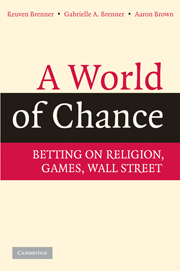Book contents
- Frontmatter
- Contents
- Preface
- Acknowledgments
- 1 From Religion to Risk Management: What to Do When Facing Uncertainty?
- 2 Anything Wrong with Gambling as a Pastime?
- 3 Are You Rich? Risk-Taking and Gambling, or the Leapfrogging Instinct
- 4 Betting on Futures and Creating Prices
- 5 Gambling as Banking: Poker, Junk Bonds, and Central Banks
- 6 Lottery Is a Taxation, and Heav'n Be Prais'd, It Is Easily Rais'd
- 7 Politics and Prohibitions; or, What's a Good Tax Anyway?
- 8 How Gamblers and Risk-Takers Correct the Future
- Appendix 1 Gambling and Risk-Taking: The Leapfrogging Instinct
- Appendix 2 Human Nature and the Civilizing Process
- Appendix 3 A Statistical Profile of Gamblers
- Notes
- Bibliography
- Name Index
- Subject Index
3 - Are You Rich? Risk-Taking and Gambling, or the Leapfrogging Instinct
Published online by Cambridge University Press: 06 July 2010
- Frontmatter
- Contents
- Preface
- Acknowledgments
- 1 From Religion to Risk Management: What to Do When Facing Uncertainty?
- 2 Anything Wrong with Gambling as a Pastime?
- 3 Are You Rich? Risk-Taking and Gambling, or the Leapfrogging Instinct
- 4 Betting on Futures and Creating Prices
- 5 Gambling as Banking: Poker, Junk Bonds, and Central Banks
- 6 Lottery Is a Taxation, and Heav'n Be Prais'd, It Is Easily Rais'd
- 7 Politics and Prohibitions; or, What's a Good Tax Anyway?
- 8 How Gamblers and Risk-Takers Correct the Future
- Appendix 1 Gambling and Risk-Taking: The Leapfrogging Instinct
- Appendix 2 Human Nature and the Civilizing Process
- Appendix 3 A Statistical Profile of Gamblers
- Notes
- Bibliography
- Name Index
- Subject Index
Summary
Which shows that some forms of gambling are entertainment and other forms offer the only chance for a good life for those who fall on hard times or reach the age of fifty and have not “made it.”
Today most people gamble either for entertainment or for the chance to become rich. Entertainment is not only the obvious playing of cards among friends or gambling in Las Vegas or Macao, but also making small bets on a sports team, or on any idea that crosses one's mind. It is possible to do the latter legally in the United Kingdom, if one finds enough people interested in the idea – see Tradesports.com, for example. Such commitment or backing of ideas with a few dollars heightens people's enthusiasm and involvement, and also helps keeping scores. It turns even boring topics into fun ones, and adds excitement to predictable games in sports, because people have a stake in the outcome.
These are games that people also play everyday and everywhere, whether betting on their favorite sports team in university dormitories or on who in the office will violate a commitment to lose weight. How often do people respond to a statement with, “Do you want to bet?”
- Type
- Chapter
- Information
- A World of ChanceBetting on Religion, Games, Wall Street, pp. 38 - 66Publisher: Cambridge University PressPrint publication year: 2008



